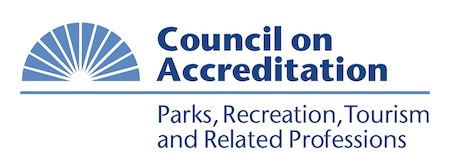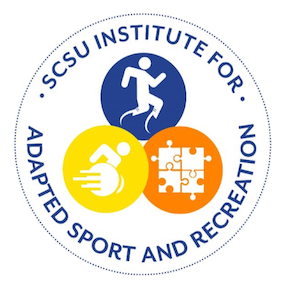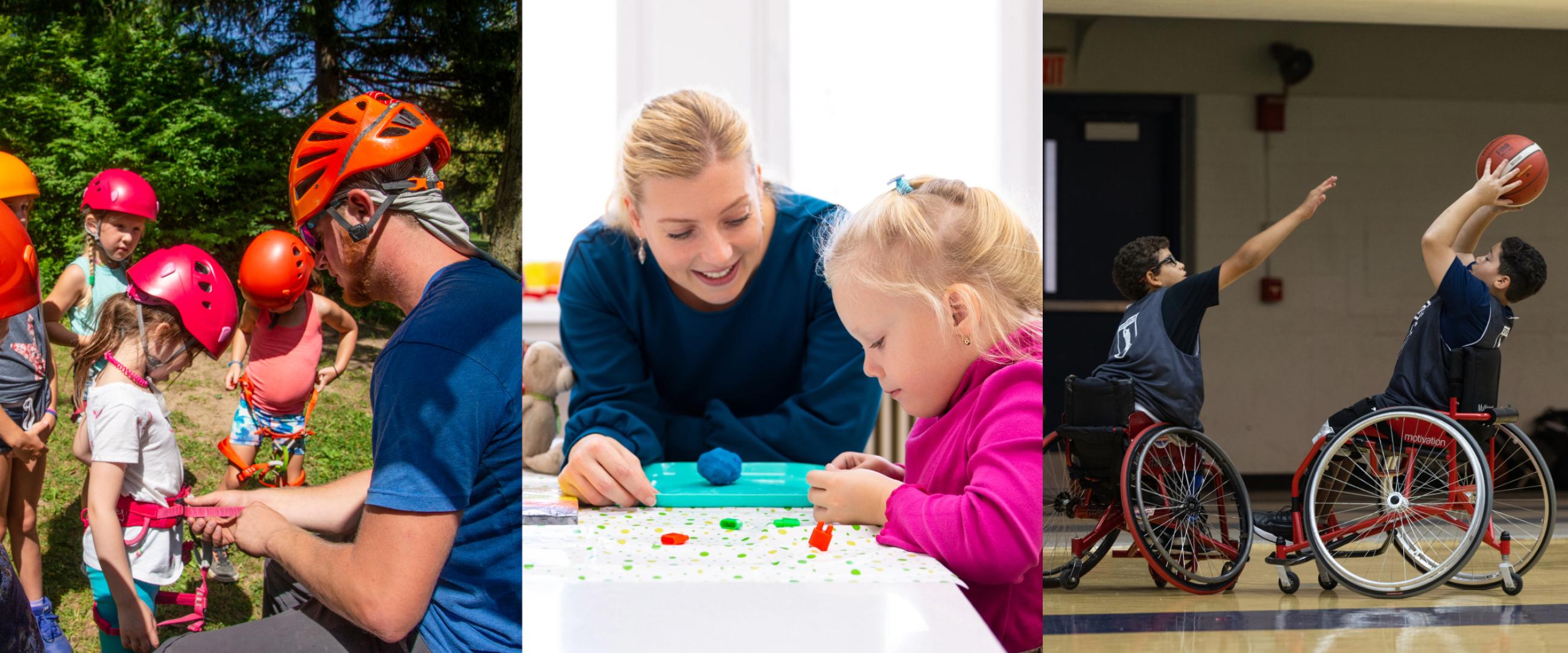The B.S. in Recreational Therapy prepares students to provide services to individuals in clinical, residential, and community settings. Students will learn to assess, plan, implement, and evaluate recreational therapy services aimed at improving the level of functioning, wellness, and overall quality of life of participants. The curriculum allows students to apply skills in recreational therapy settings through in-class activities, practicums, and internship experiences.
Concentrations
Recreational Therapy
In the Recreational Therapy concentration, students acquire the skills necessary to help improve the quality of life for children and adults with disabilities by using recreational activities and leisure experiences to reach client goals. Graduates of the program will be prepared for careers in a variety of settings, including hospitals, rehabilitation centers, long-term care facilities, community, and youth-serving agencies. They will be equipped to work with diverse populations, including children, adolescents, adults, and older adults, addressing a range of physical, cognitive, emotional, and behavioral challenges. In addition, students are prepared to take the National Council for Therapeutic Recreation Certification (NCTRC) exam to become a nationally Certified Therapeutic Recreation Specialist (CTRS). In addition, students can take courses that meet the State of Connecticut Public Health Code to become a Therapeutic Recreation Director.
Rehabilitation (RT-OT)
The Rehabilitation (RT – OT) concentration is designed to provide students with a comprehensive foundation in recreation therapy, preparing them for careers in recreational therapy while simultaneously fulfilling prerequisite coursework for advanced study in occupational therapy at the graduate level. This is considered a pre-Occupational Therapy program.
Youth Development and Leadership
Curriculum is tailored to provide recreational therapy with a focus on promoting health and wellness as well as reducing or eliminating activity limitations or restrictions to individuals in settings such as non-profit youth organizations, residential facilities, group homes, and municipal/state agencies.
Child Life Specialist
The Child Life Specialist concentration introduces the history, philosophy, theories, and concepts relating to child life services, as well as the role of a child life specialist as a member of the healthcare team is examined. This concentration can lead to certification as a child life speciaist.
Program Features
- Nationally Accredited program through the Council on Accreditation of Parks, Recreation, Tourism and related fields (COAPRT).
- Specialized concentrations that tailor educational interests to career goals
- Skill development in program planning, assessment, and management
- Embedded practical experiences with our Institute of Adapted Sport and Recreation, and Recreational Therapy Clinic.
- Immersive internship experiences to put learned theories and course concepts into practice
- Professional development through conferences, workshops, seminars, career fairs, and participation in Interprofessional Education events.
- Faculty with professional experience in their field.
- Tuition break for those who reside in any New England state, as well as NY, NJ, and PA, who pay a reduced out-of-state tuition.
- Lead to Certification/Licensure as a Certified Therapeutic Recreation Specialist (CTRS).
- An accelerated degree program in Recreation Therapy offers the opportunity to complete your B.S./M.S. in five years.

Students graduating from the program shall:
- Demonstrate entry-level knowledge of the therapeutic recreation profession in history, theory, philosophy, and sciences and the scope and practices of recreation therapy/therapeutic recreation across diverse delivery systems.
- Demonstrate the ability to assess, plan, implement, document, and evaluate therapeutic recreation services that facilitate targeted outcomes and that embrace personal and cultural dimensions of diversity.
- Demonstrate entry-level knowledge and competence of the theories, principles, and practices of management/administration of therapeutic recreation services.
- Demonstrate, through an internship consistent with NCTRC requirements for completed hours and weeks (or state requirements if more stringent), the sustained ability to apply the therapeutic recreation process, engage in advocacy, stimulate innovation, and use diverse and structured ways of thinking to solve problems related to different facets of professional practice.
- Demonstrate effective written and oral communication skills commensurate with professional practice.
- Demonstrate critical thinking skills, enabling students to comprehend and effectively analyze issues, make decisions, and form sound and well-based judgments.
Our Vision
Our vision is to be the preeminent Recreation, Tourism, and Sport Management program in the region.
Our Mission
To facilitate student-centered success through learning and leadership development, incorporating innovative teaching strategies that integrate relevant research, community service, and a practitioner perspective gained through experiential learning opportunities and connections leading to careers in recreation, tourism, sport, and related professions.
Values
The Department of Recreation, Tourism and Sport Management values:
- Personal and Professional Excellence
- Student-Centered Approach
- Practical Service-Based Learning
- Collaborative Community Relationships
- Inclusive, Diverse Environment
Recreational Therapy Concentration
The Recreational Therapy program at Southern Connecticut State University is accredited by the Council on Accreditation for Parks, Recreation, Tourism and Related Professions (COAPRT). COAPRT recognizes academic programs in colleges and universities that prepare new professionals to enter the parks, recreation, tourism and related professions COAPRT Accreditation is a status granted to an academic program that meets or exceeds stated criteria of educational quality. In the United States, accreditation of professional preparation curricula is conferred by non-governmental bodies, which are often closely associated with professional associations in the field. COAPRT accredits baccalaureate degree programs in this profession. COAPRT is accredited by the Council on Higher Education Accreditation (CHEA).
Important Information Regarding Degree Mills
Please watch this important video regarding degree and accreditation mills. According to CHEA, "Degree mills and accreditation mills mislead and harm. In the United States, degrees and certificates from mills may not be acknowledged by other institutions when students seek to transfer or go to graduate school. Employers may not acknowledge degrees and certificates from degree mills when providing tuition assistance for continuing education. "Accreditation" from an accreditation mill can mislead students and the public about the quality of an institution. In the presence of degree mills and accreditation mills, students may spend a good deal of money and receive neither an education nor a useable credential." Read more on CHEA's website.
Program Evaluation
COAPRT standard 2.05.05 requires reporting of aggregated results of learning outcomes assessment. Results for the most recent academic year (2022/2023) follow.
Recreational Therapy
7.01 During the 2024-2025 academic year, 100% of students averaged a 7.5 or above on their medical terminology modules and abbreviations (5) demonstrating entry level knowledge of the scope of the TR profession and its associated delivery systems, and the foundations of the TR profession.
7.02 During the 2024-2025 academic year, 100% of students scored 80 or above for case studies (5) assignment demonstrating the ability to design, implement, and evaluate services that facilitate targeted human experiences and that embrace personal and cultural dimensions of diversity.
7.03 During the 2024-2025 academic year, 92% of students scored 80 or above on program development assignment demonstrating entry-level knowledge about the management and administration of TR services.
Careers
Professionals trained in these fields work in a variety of settings: Hospitals and rehabilitation settings. Local parks and recreation agencies, and not-for-profit agencies.
Recreational Therapy / Rehabilitation (RT to OT) Concentrations
Students graduating from the Recreational Therapy program have obtained positions as recreation therapists at the West Haven V.A., Hospital for Special Care, Gaylord Hospital, Guilford House, Department of Mental Health and Addictions, Department of Family and Children, and Yale New Haven Hospital. Other locations include:
- Acute Care Hospitals
- Psychiatric and Rehabilitation Hospitals
- Residential Facilities
- Long-Term Care, Skilled Nursing Facilities
- Adult Day Care Facilities
- Non-Profit and Municipal Agencies
- Wilderness Adventure Programs
According to the Bureau of Labor Statistics, employment of recreational therapists is projected to grow 4 percent from 2022 to 2032, about as fast as the average for all occupations. About 1,300 openings for recreational therapists are projected each year, on average, over the decade. Many of those openings are expected to result from the need to replace workers who transfer to different occupations or exit the labor force, such as to retire. According to the Economic Development Employer Planning System report, there is an average of 20 new TR jobs each year in Connecticut.
Typical Job Titles
- Recreational Therapist
- Therapeutic Recreation Specialist
- Therapeutic Recreation Director
- Activity Therapist
- Rehabilitation Therapist
- Child Life Therapist

Institute for Adapted Sports and Recreation
The Institute for Adapted Sports and Recreation provides programs for individuals with various disabilities. Through the institute, we also offer recreational therapy to individuals with disabilities living in the community. We have partnered with local organizations, where graduate students facilitate leisure activities as a way for clients to develop social skills.
School / College
College of Health & Human Services
Department
Recreation, Tourism and Sport Management
Contact
Dr. Mary Jo Archambault

